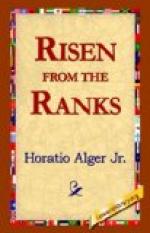He entered that body, the youngest member in it. But his long connection with a Debating Society, and the experience he had gained in parliamentary proceedings, enabled him at once to become a useful working Member. He was successively re-elected for several years, during which he showed such practical ability that he obtained a State reputation. At twenty-eight he received a nomination for Congress, and was elected by a close vote. During all this time he remained in charge of the Centreville “Gazette,” but of course had long relinquished the task of a compositor into his brother’s hands. He had no foolish ideas about this work being beneath him; but he felt that he could employ his time more profitably in other ways. Under his judicious management, the “Gazette” attained a circulation and influence that it had never before reached. The income derived from it was double that which it yielded in the days of his predecessor; and both he and Ferguson were enabled to lay by a few hundred dollars every year. But Harry had never sought wealth. He was content with a comfortable support and a competence. He liked influence and the popular respect, and he was gratified by the important trusts which he received. He was ambitious, but it was a creditable and honorable ambition. He sought to promote the public welfare, and advance the public interests, both as a speaker and as a writer; and though sometimes misrepresented, the people on the whole did him justice.
A few weeks after he had taken his seat in Congress, a young man was ushered into his private room. Looking up, he saw a man of about his own age, dressed with some attempt at style, but on the whole wearing a look of faded gentility.
“Mr. Walton,” said the visitor, with some hesitation.
“That is my name. Won’t you take a seat?”
The visitor sat down, but appeared ill at ease. He nervously fumbled at his hat, and did not speak.
“Can I do anything for you?” asked Harry, at length.
“I see you don’t know me,” said the stranger.
“I can’t say I recall your features; but then I see a great many persons.”
“I went to school at the Prescott Academy, when you were in the office of the Centreville ‘Gazette.’”
Harry looked more closely, and exclaimed, in astonished recognition, “Fitzgerald Fletcher!”
“Yes,” said the other, flushing with mortification, “I am Fitzgerald Fletcher.”
“I am glad to see you,” said Harry, cordially, forgetting the old antagonism that had existed between them.
He rose and offered his hand, which Fletcher took with an air of relief, for he had felt uncertain of his reception.
“You have prospered wonderfully,” said Fletcher, with a shade of envy.
“Yes,” said Harry, smiling. “I was a printer’s devil when you knew me; but I never meant to stay in that position. I have risen from the ranks.”




